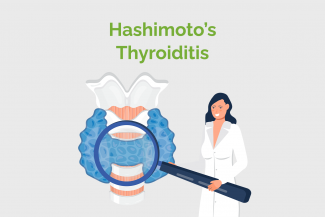
Medication
Hashimoto’s thyroiditis responds well to treatment. It is treated with a single daily tablet of levothyroxine. This is a man-made form of T4 thyroid hormone. It is also called thyroid replacement therapy because it restores back to normal the T4 that the damaged thyroid can no longer make. It usually needs to be taken for the rest of a person’s life.
Follow-up treatment
After you start your medication, you will need a follow-up TSH test so your doctor can fine-tune your dose. The thyroid hormone acts very slowly in the body, so it can take several months after the start of treatment for symptoms to go away and the goiter to shrink. If the dose is too strong, thyroid hormone levels will become too high (hyperthyroidism). Too much thyroid hormone can cause heart problems and bone loss. So finding the right dose is important. Once the TSH level is normal, your doctor will need to see you less often. Most people have a thyroid checkup and TSH test once a year. Usually, the same treatment dose works for a long time and often does not need to be adjusted until a person is in their 70s or 80s. Yet, the dose may need to be changed in some cases, such as with pregnancy, heart disease, or if using menopausal hormone therapy.
Surgery
In certain cases, the doctor may recommend surgery. Surgery may be required if the enlarged gland causes pressure symptoms. Operations are indicated in patients with suspected or established Hashimotos thyroiditis for:
- the presence of a dominant mass with partial decrease in size even after suppressive therapy
- Progression of thyromegaly (enlarged thyroid) even after suppressive therapy
- Historic or physical findings suggest a malignancy, eg, irradiation, multiple endocrine adenomatosis (MEA) syndrome, nerve paralysis, pain, tracheal compression, stipple calcification and cervical lymph node enlargement






